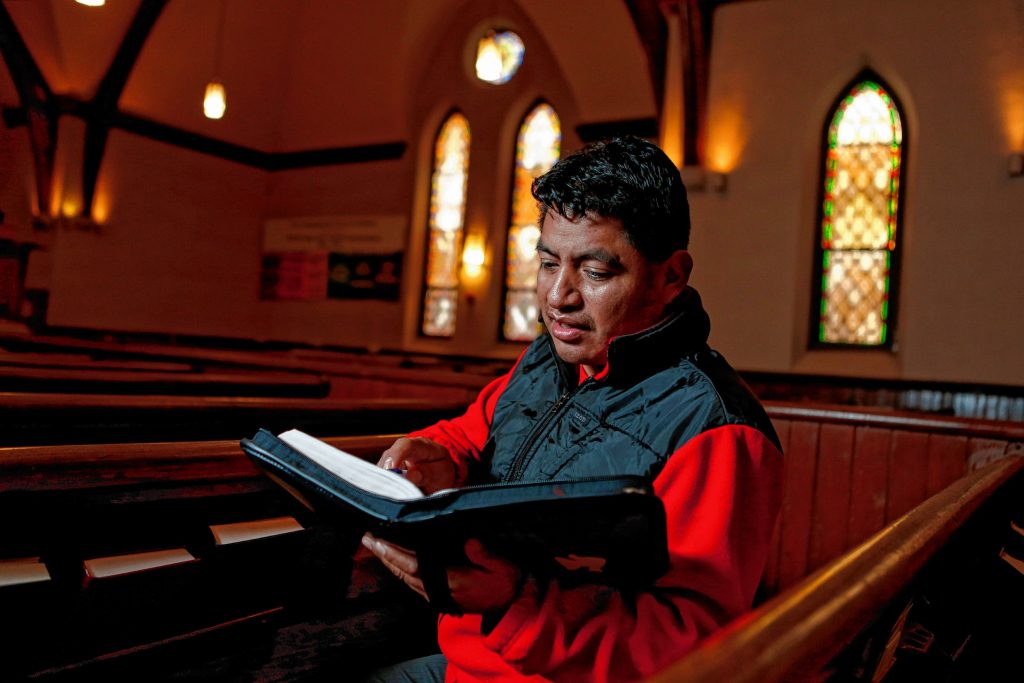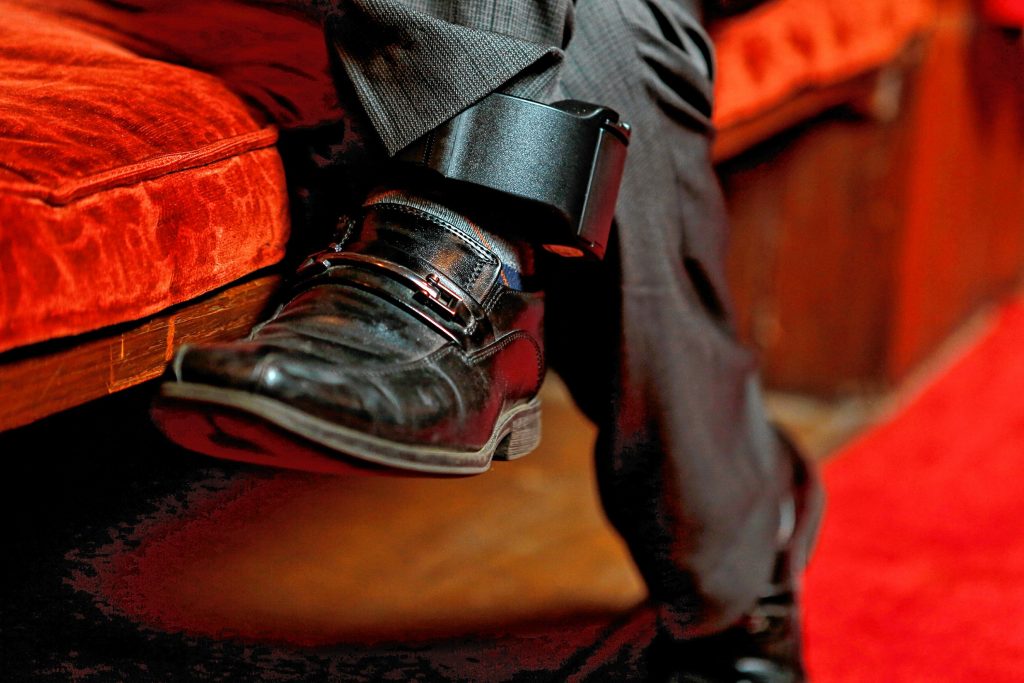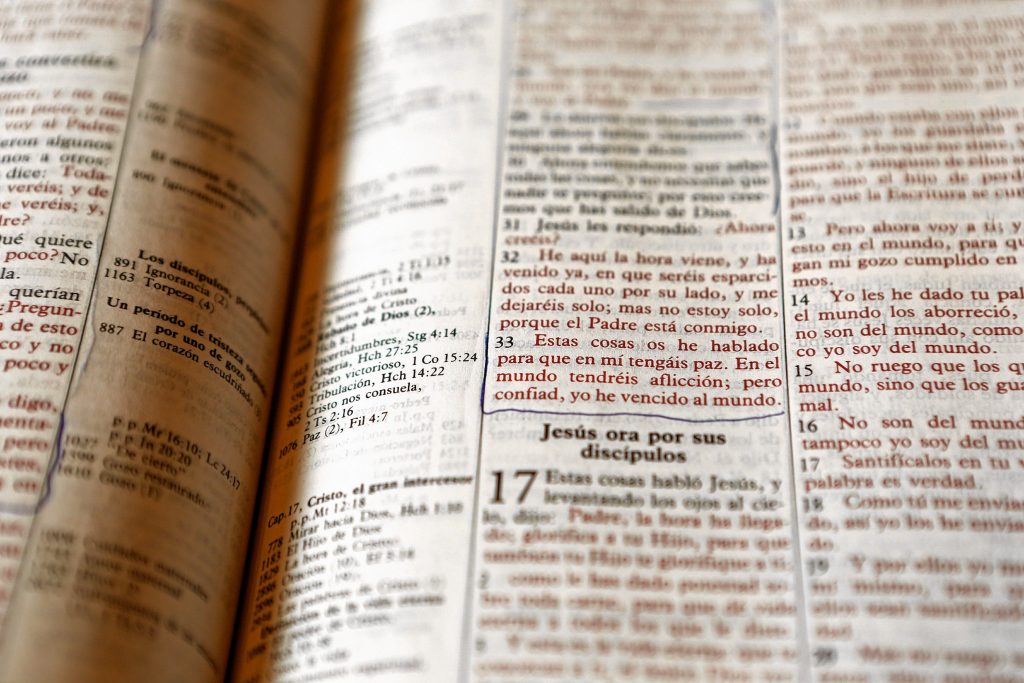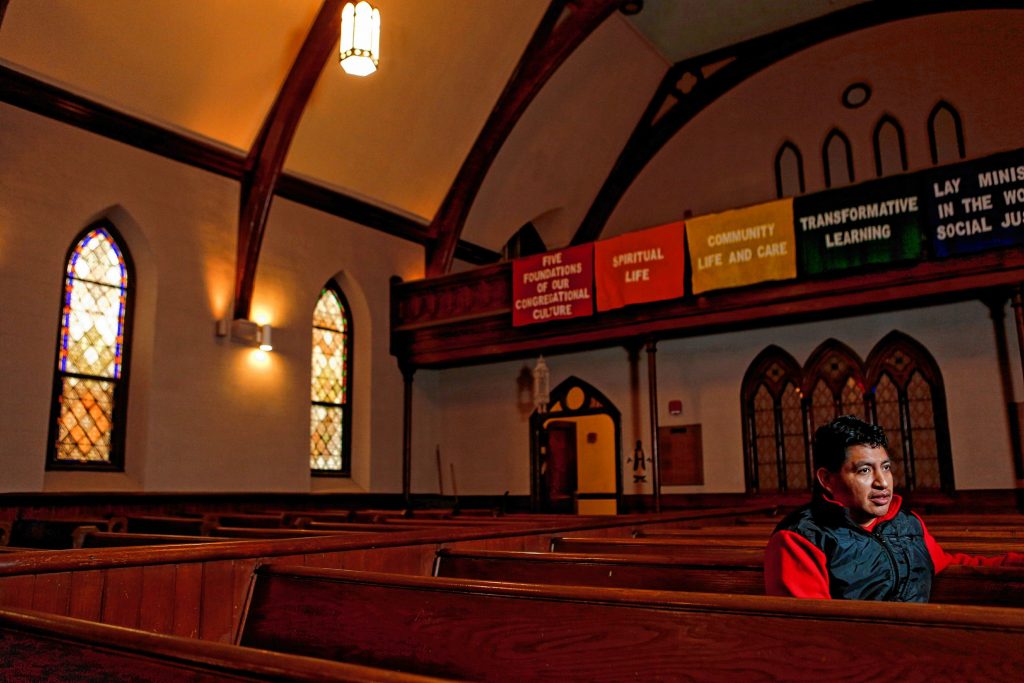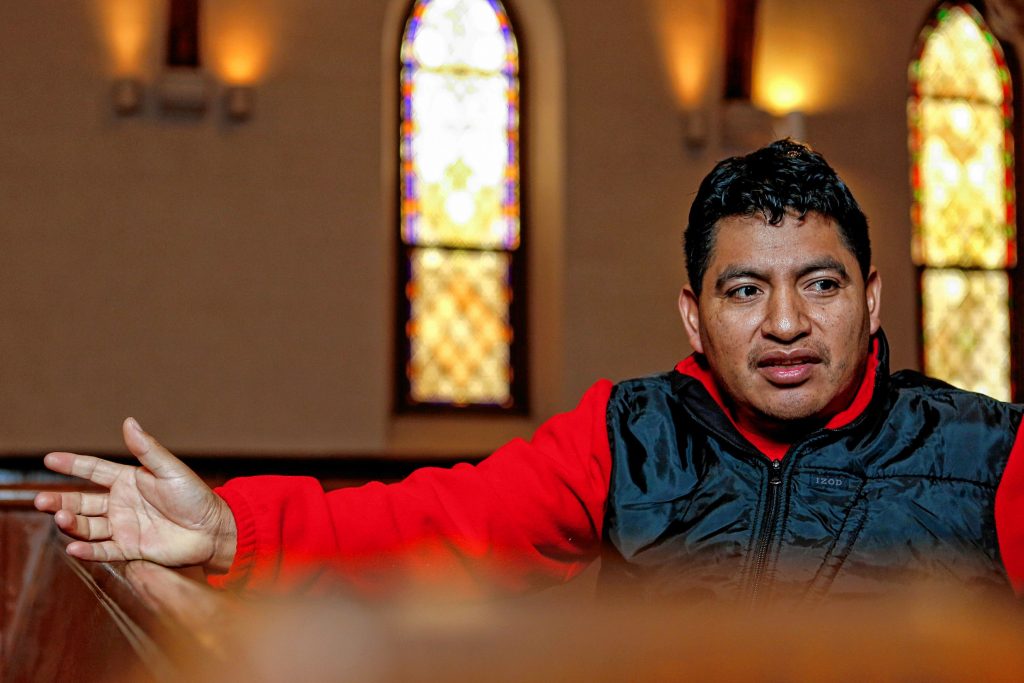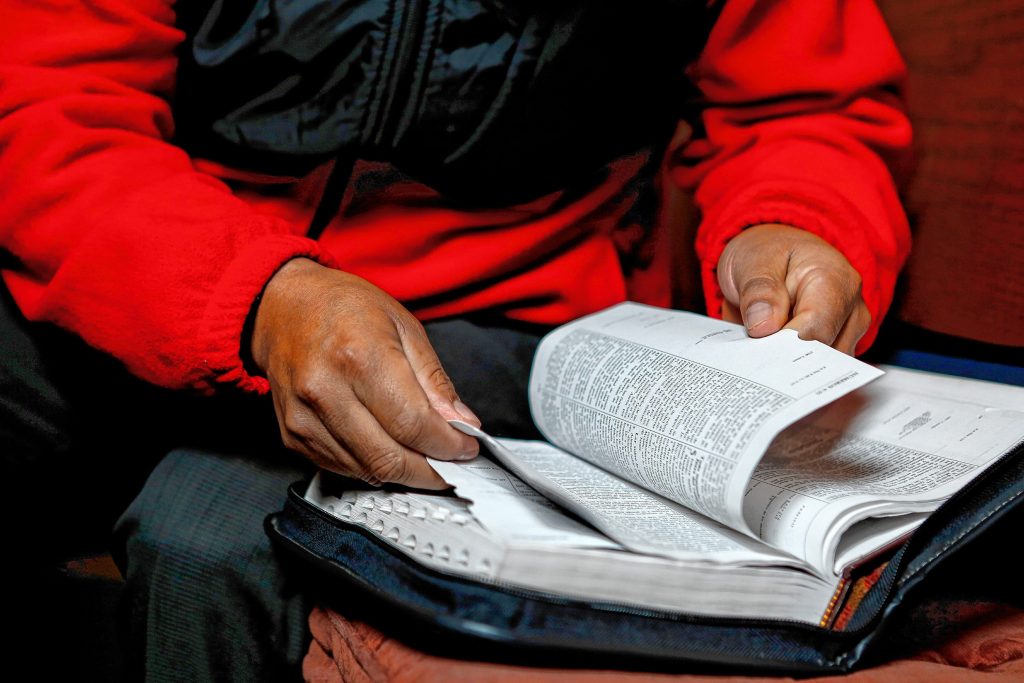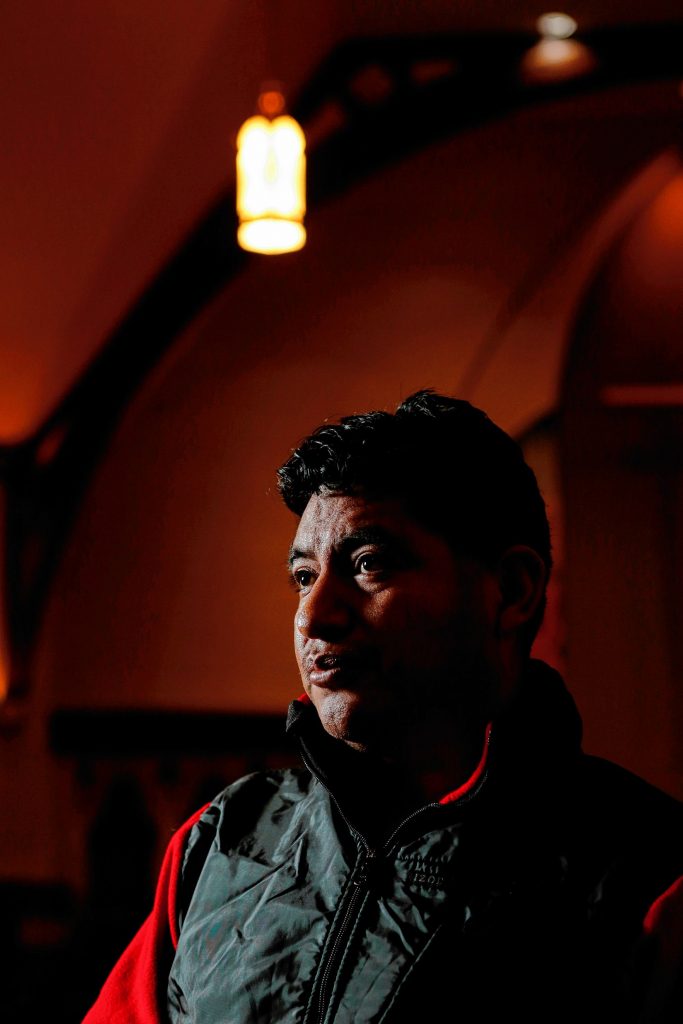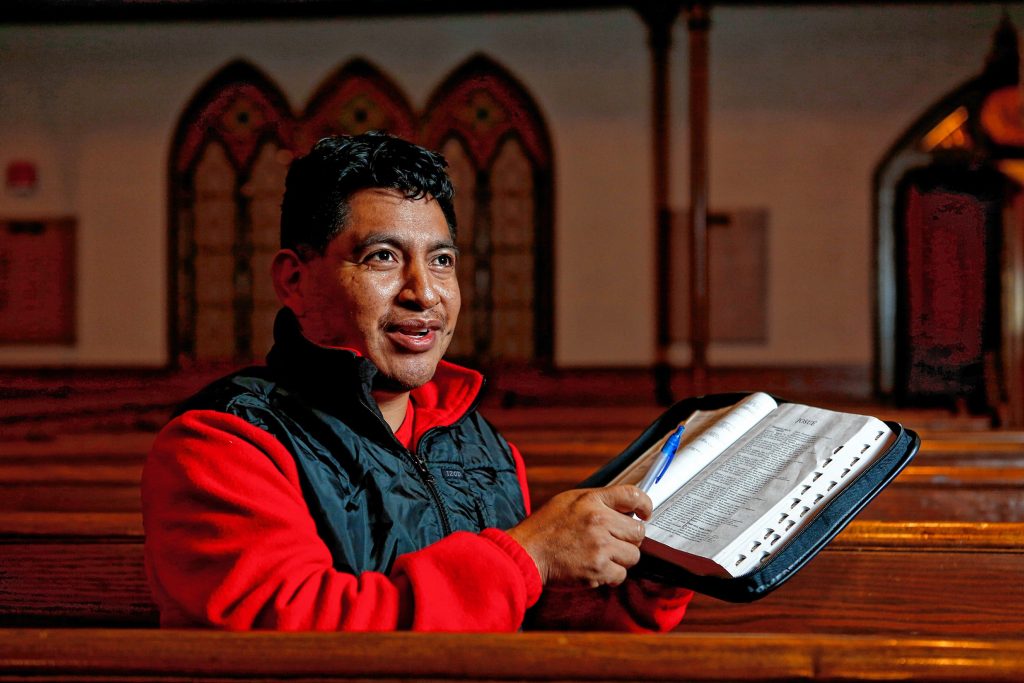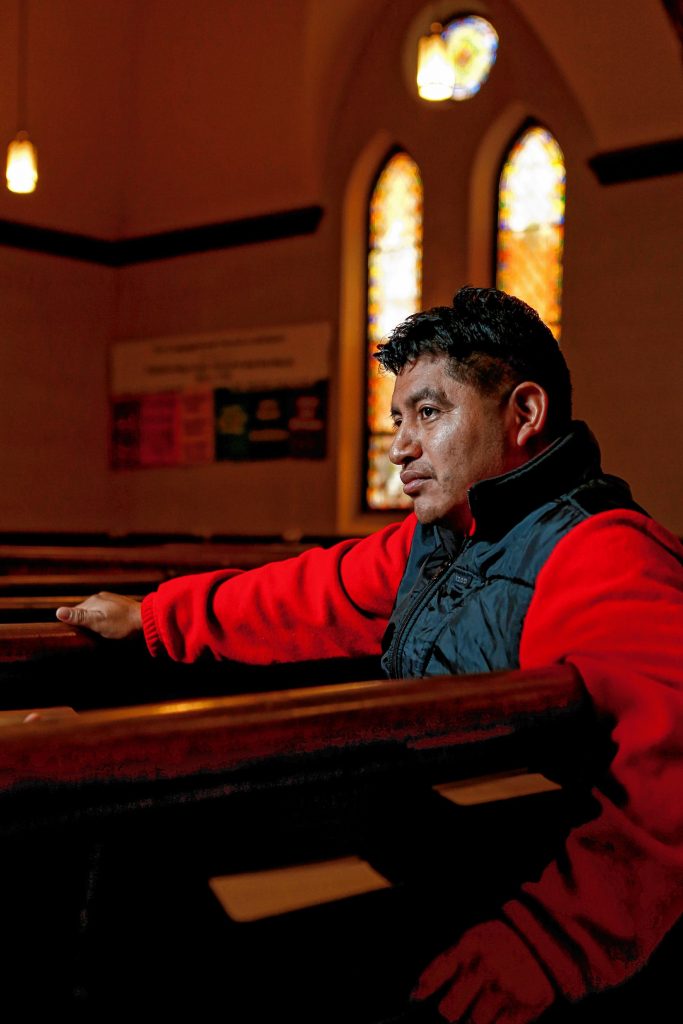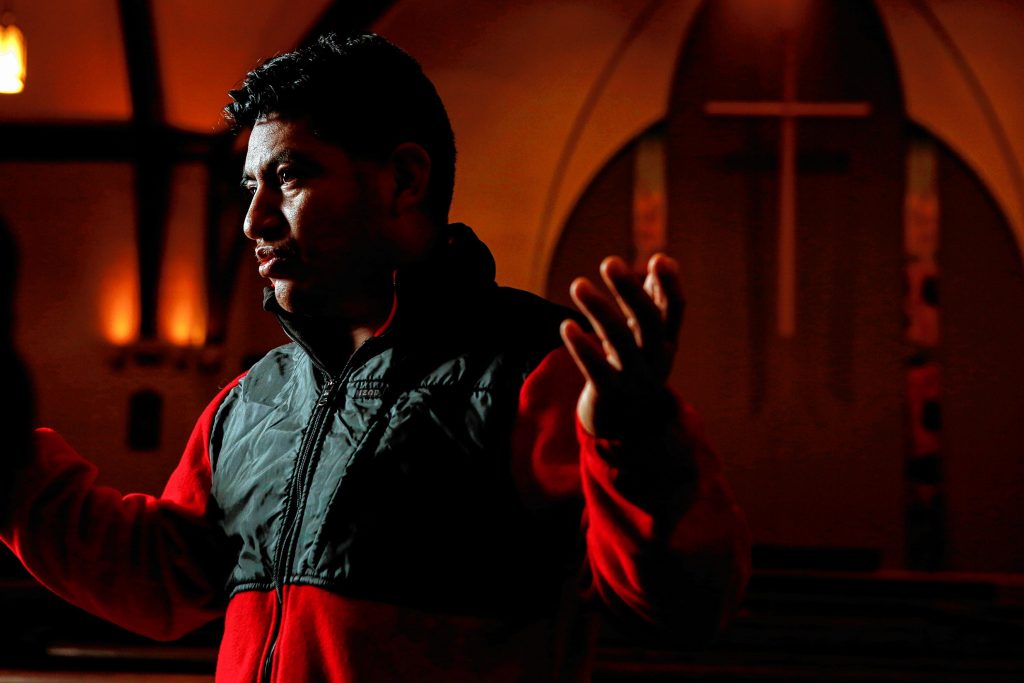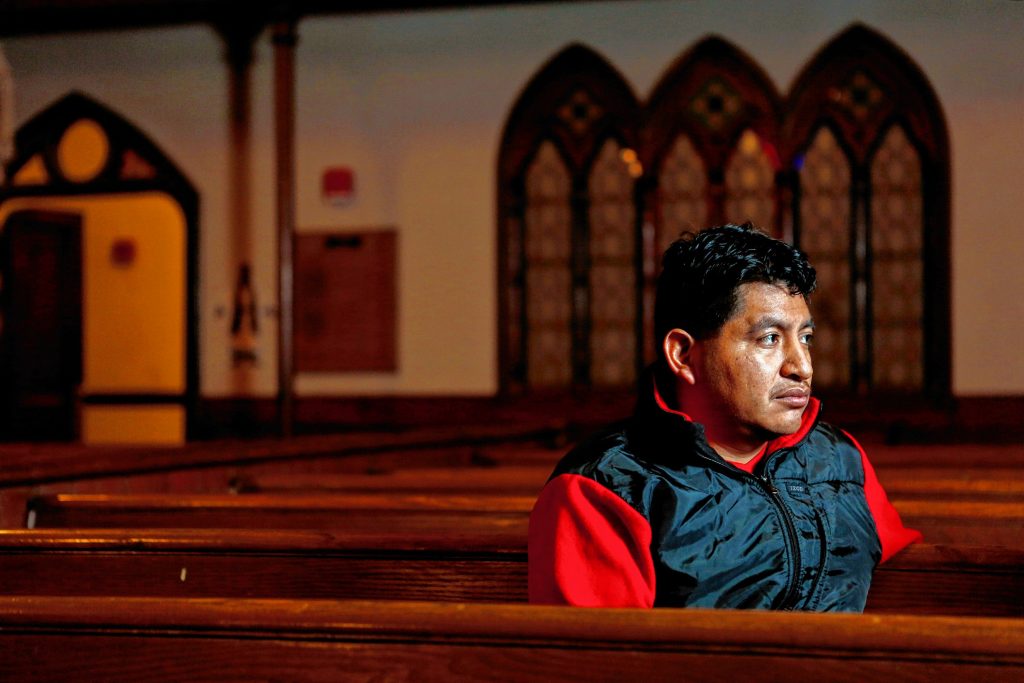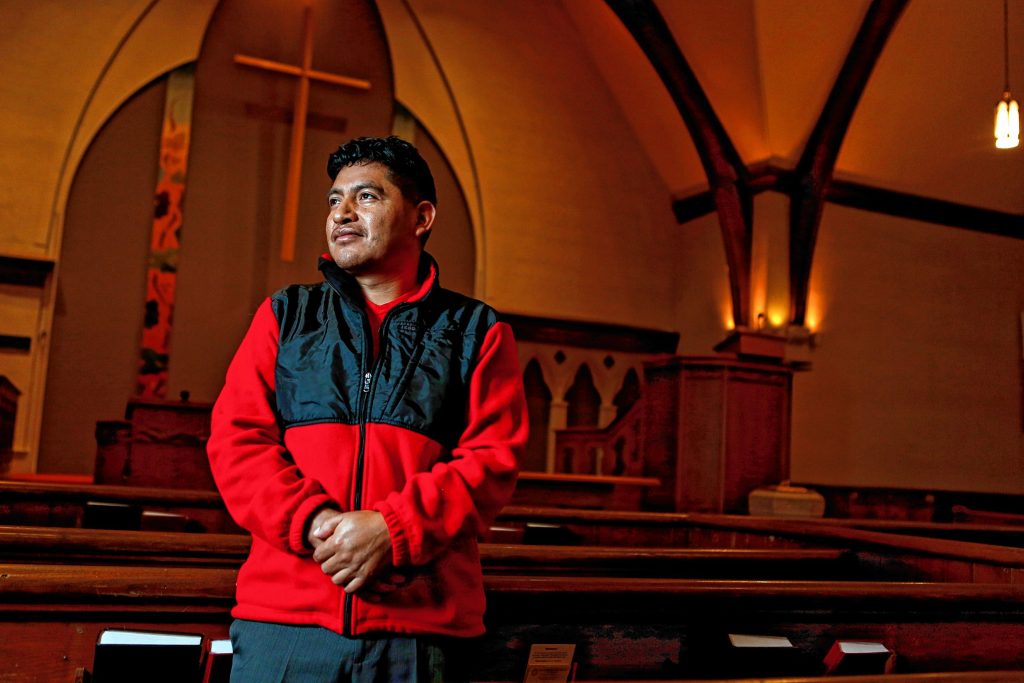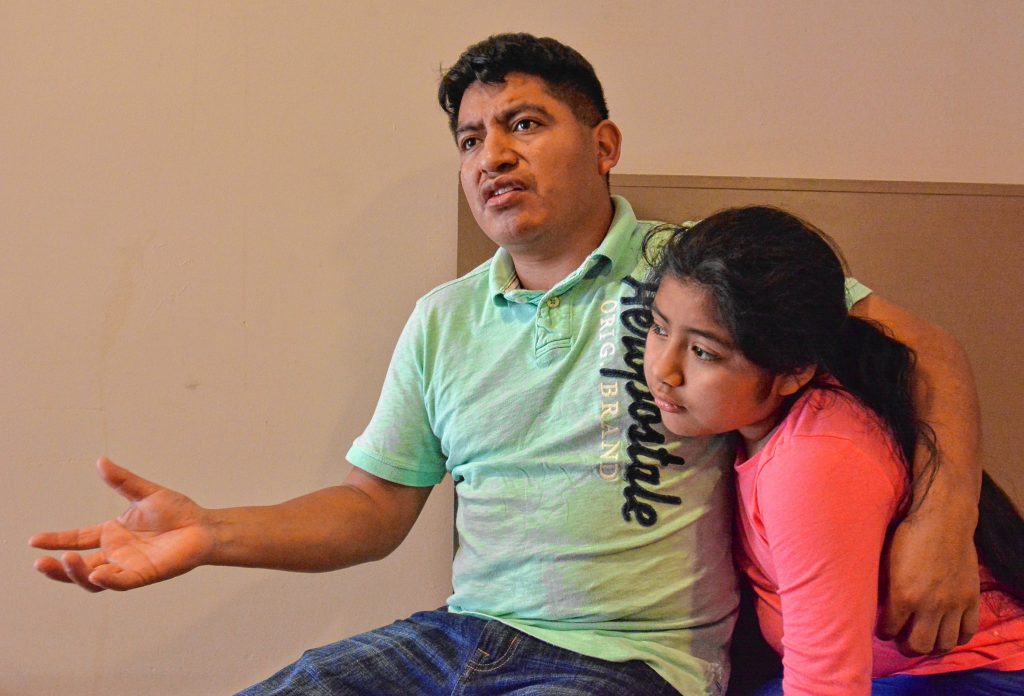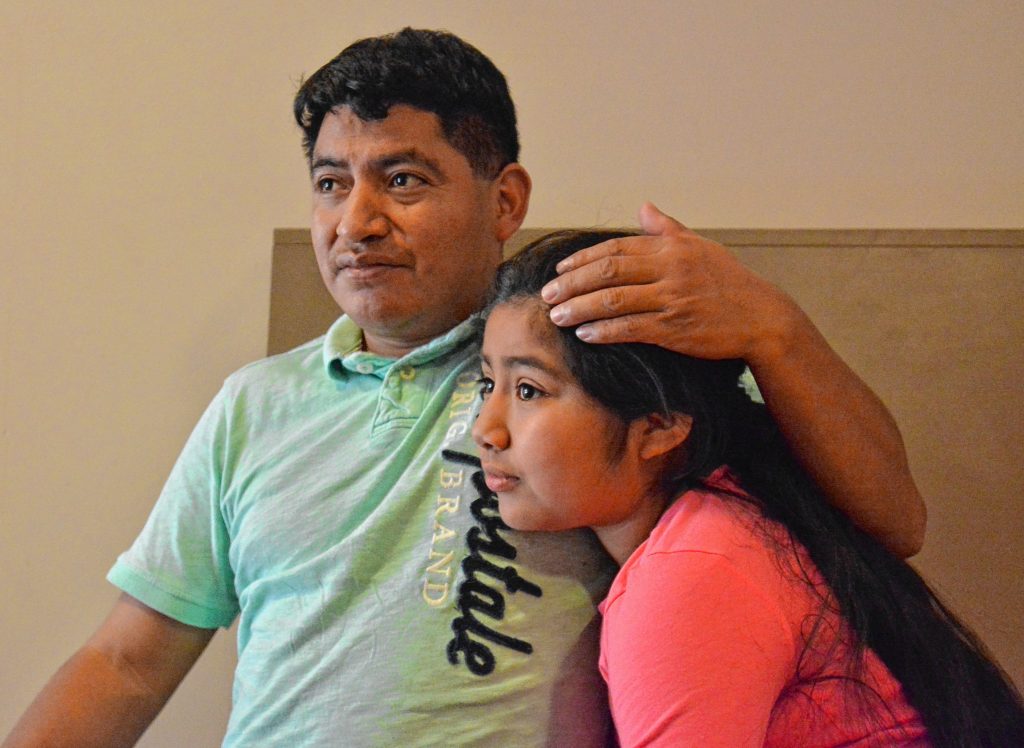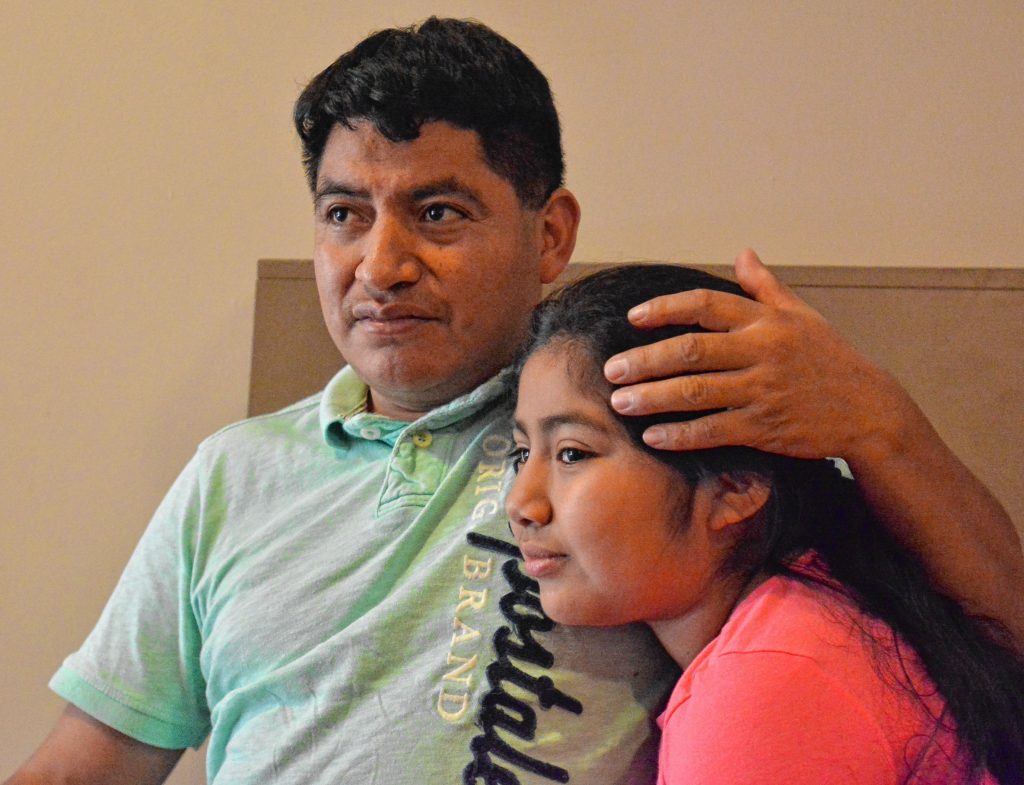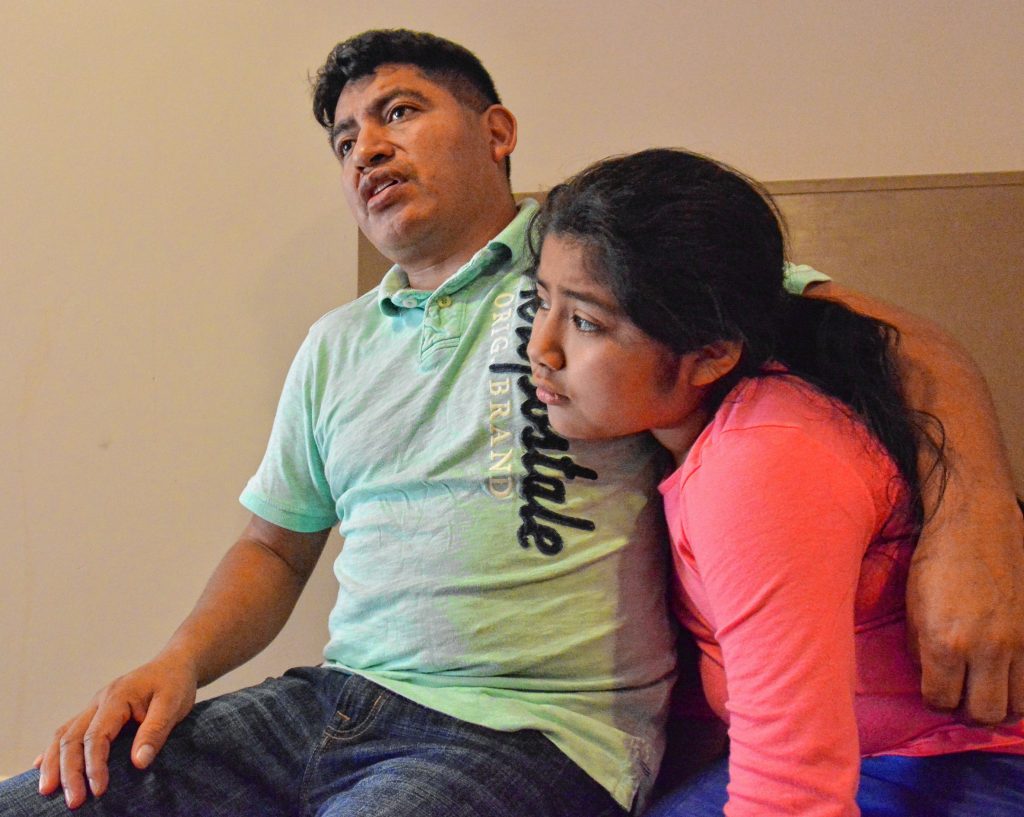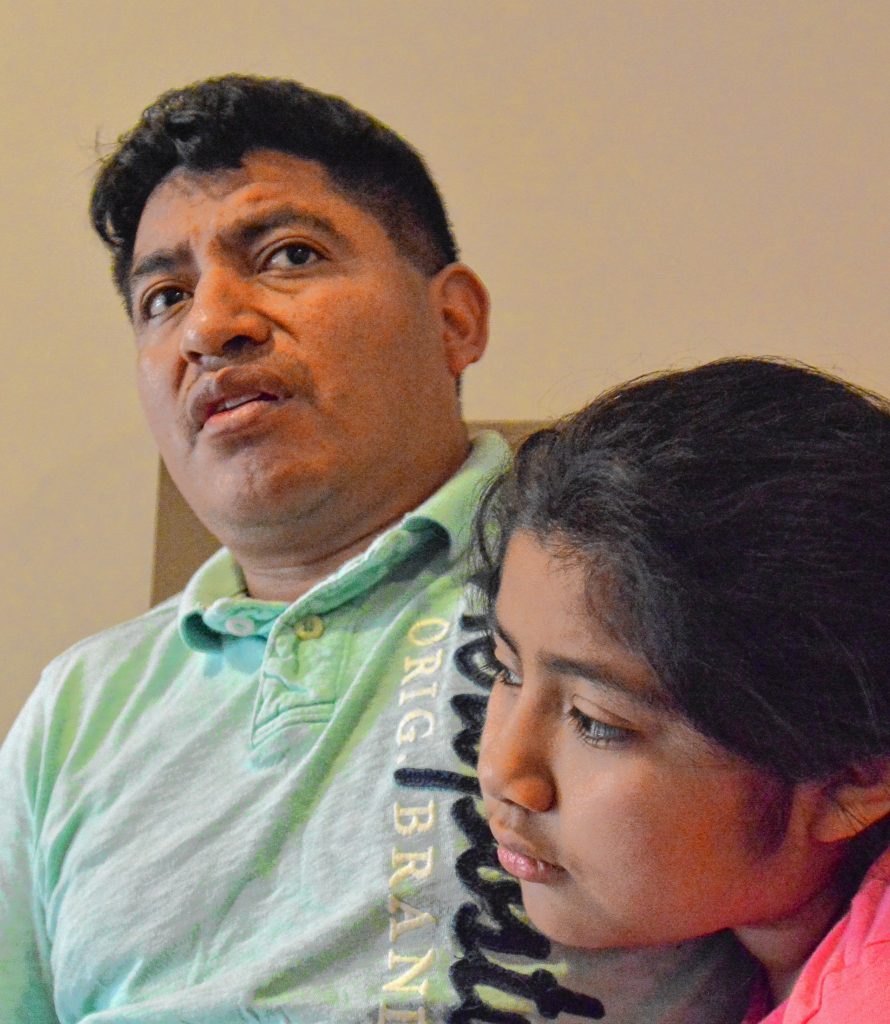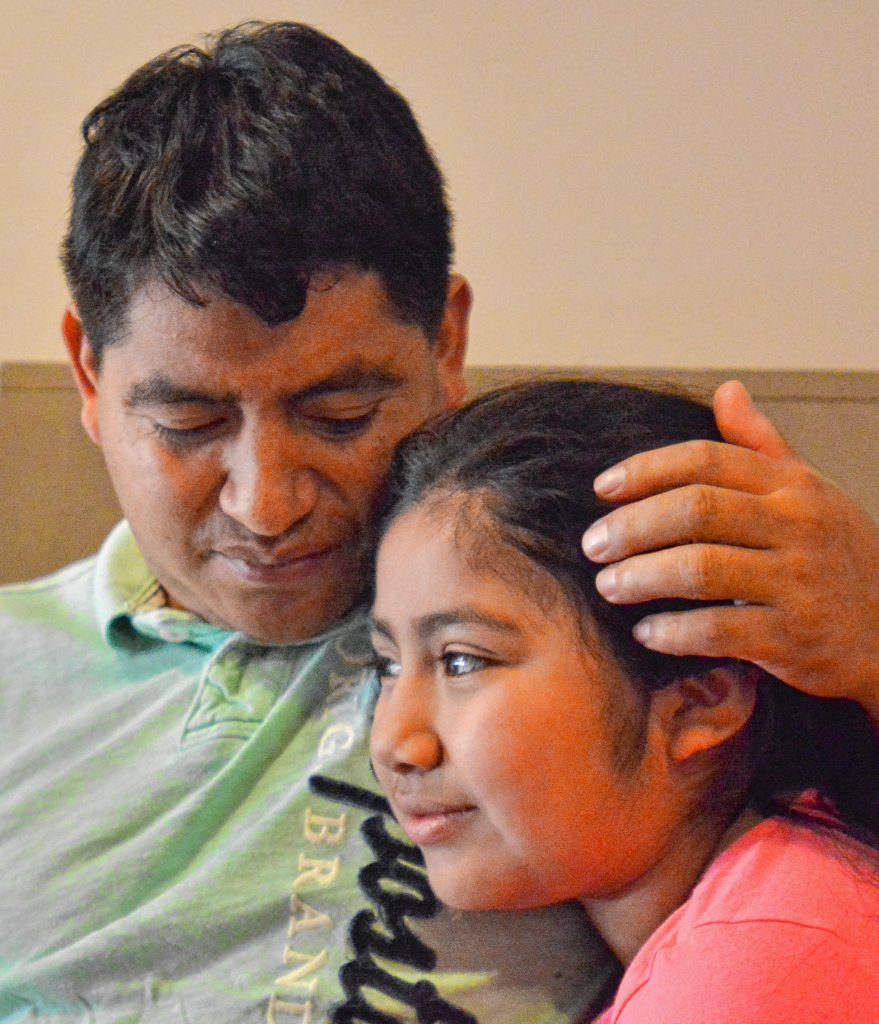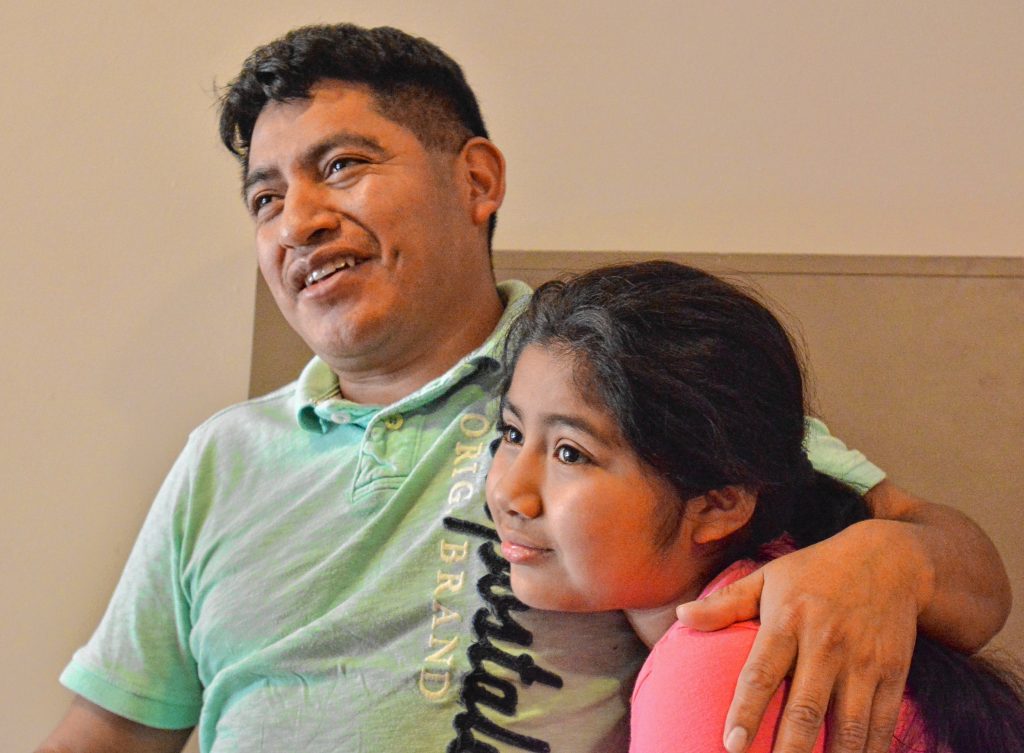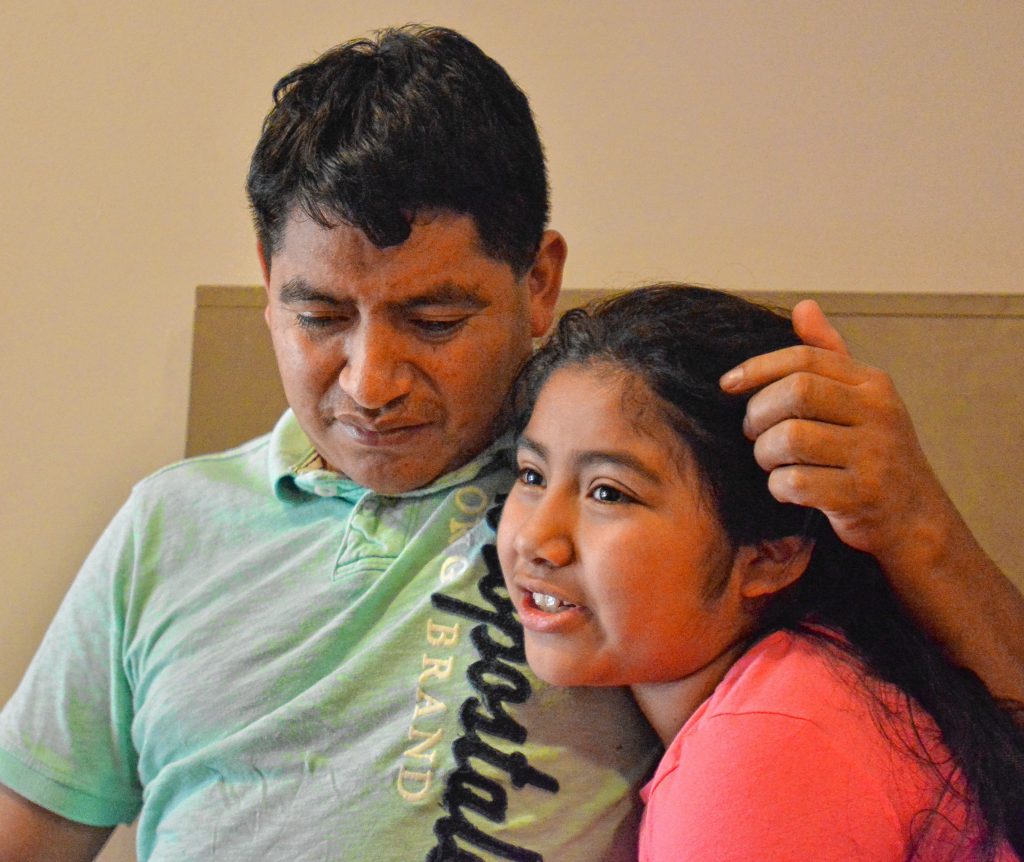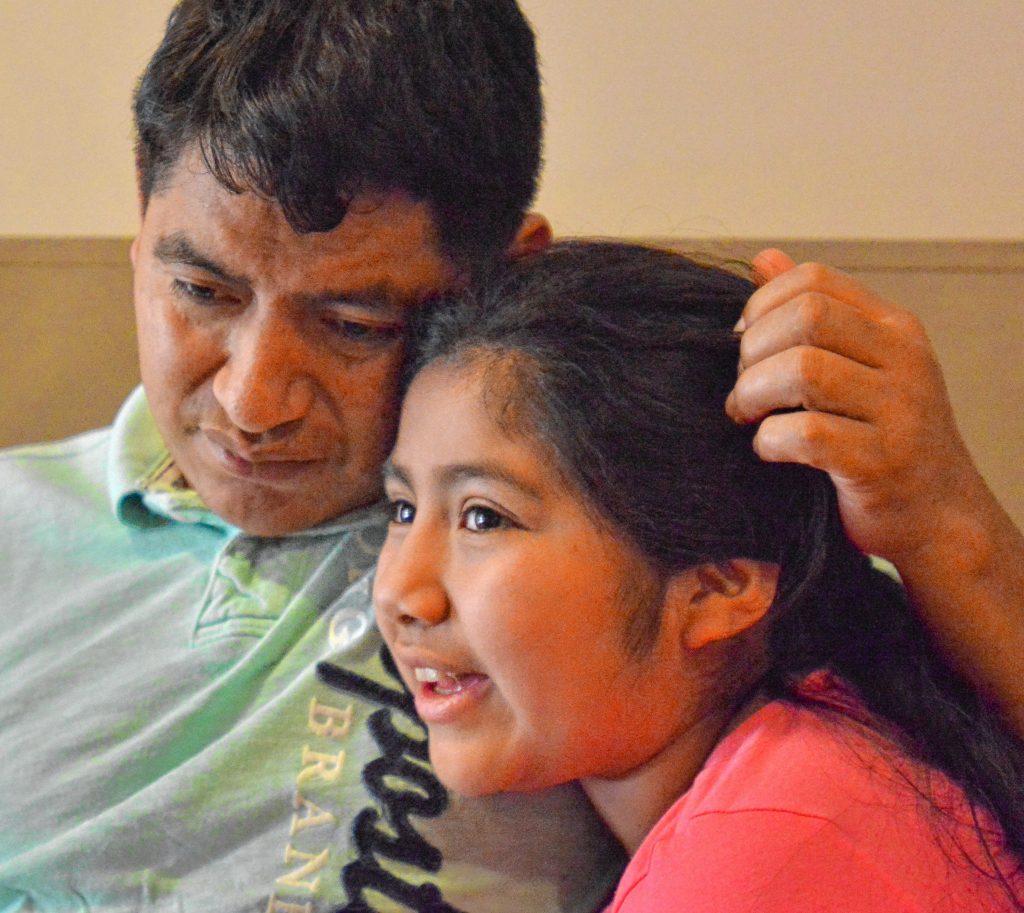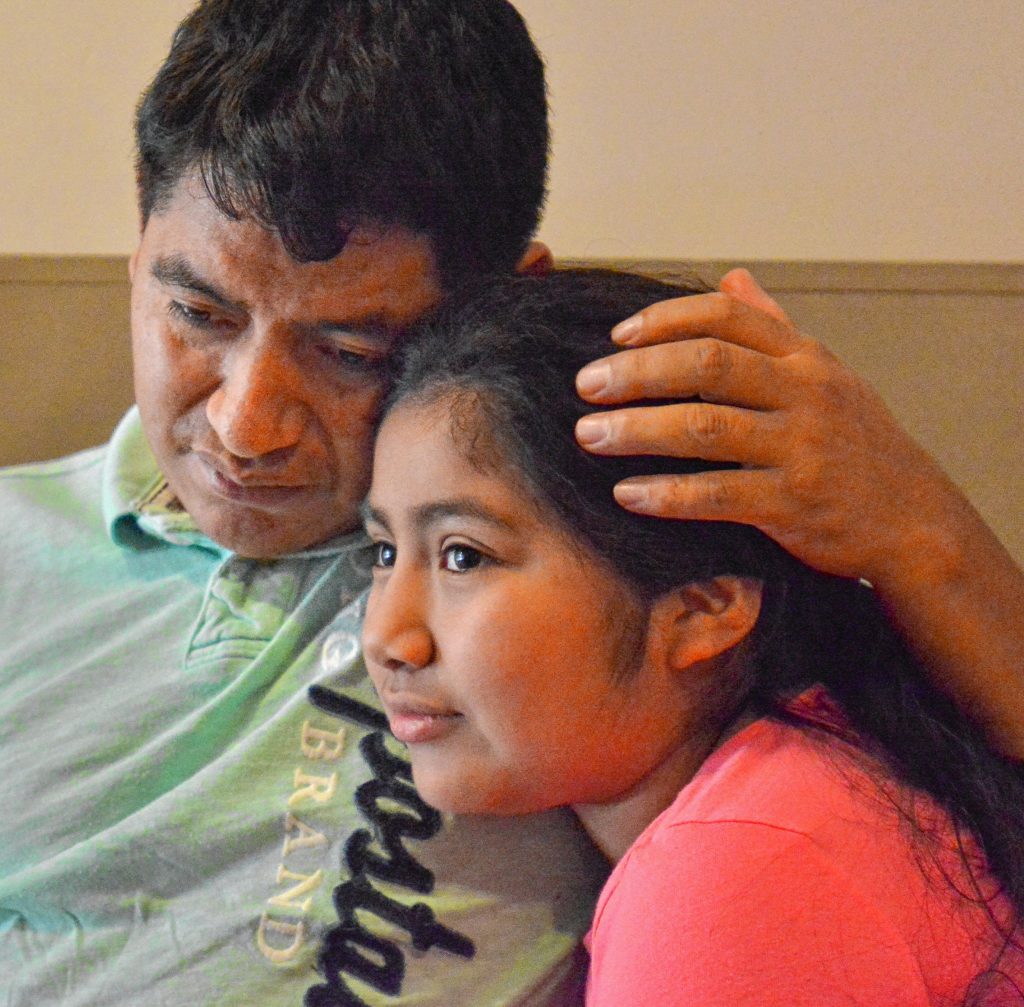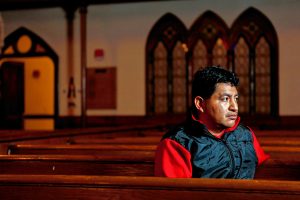
The church is providing Lucio Perez sanctuary while he waits for his case to be reopened after Immigration and Customs Enforcement denied his stay of removal.
When her four children go to sleep at night, Dora Gonzalez says her youngest, 8-year-old Lucy, often wakes up around 1 a.m. and says, “I miss my dad.” Her oldest son is graduating high school this spring, and Gonzalez worries his father, Lucio Perez, won’t be able to watch him receive his diploma.
“It’s not easy being away from family,” she said in a recent interview. “More for the kids, because they need him. They need his help and his hugs.”
Lucy, snuggling under her dad’s outreached arm for the first time in a week, was quick to offer up the activity she misses doing the most: “Going to church with him.”
It was at an Amherst church that Lucy got a chance to see her father, not in the family’s regular congregation in Springfield. Instead, Perez is confined to the walls of First Congregational Church, where he took up sanctuary Oct. 18 after immigration authorities ordered his deportation to Guatemala — a country he left almost 20 years ago.
Under the administration of President Barack Obama, undocumented immigrants like Perez weren’t a priority for deportation as authorities instead focused on violent criminals and those who posed national security risks. Perez was granted five stays of deportation, and checked in for regular visits with Immigration and Customs Enforcement, or ICE.
But after President Donald Trump took office in January, Perez’s lawyer Matt Cameron said, noncriminal cases like Perez’s were prioritized, and in July he was denied another stay. Authorities ordered him to purchase a ticket to Guatemala in October.
Perez’s dress slacks conceal the bulky electronic monitoring bracelet that ICE put on his ankle, but its weight is a constant reminder that his movements are tracked. That’s why he doesn’t leave the walls of his new home, where he can do nothing but wait: for immigration officials to reopen his case, for community members to bring him food, for his family to make the drive from Springfield to visit him.
To pass the time, Perez listens to music, attends church service, has visitors and, most importantly for him, reads the Bible.
“If I close myself in there, without my family and not hearing their voices and laughter, loneliness follows,” Perez said in his native Spanish. Having left poverty and violence behind in Guatemala at 18, the 35-year-old Perez said he dreads being completely separated from his children and wife — the loved ones he moved to the United States to give a better life, he said.
Back at home, Gonzalez says her husband’s absence has shattered all semblance of normalcy, and the better life they worked so hard for is in jeopardy. Family movies have been replaced with worries about how Gonzalez is going to pay the rent and bills.
“He supported us. I work, but not a lot,” Gonzalez said. She now has four children to feed on her own, including three teenage boys, without the income from Perez’s landscaping work. More than that, however, she worries about her children’s emotional well-being.
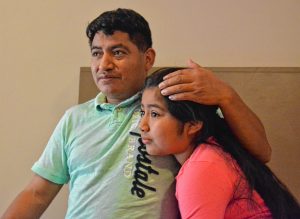
Lucio Perez, of Springfield, who is an undocumented immigrant who was facing deportation until he took refuge at First Congregational Church of Amherst Oct. 18, spends time with his daughter, Lucy, 8, Saturday at the church.
“I don’t want them to grow up with this pain, with this trauma,” she says.
ICE crackdown
Perez’s case comes amid an immigration crackdown in Massachusetts, where ICE agents arrested 50 people in late September during four days of nationwide raids. At least eight were from western Massachusetts, according to immigrant advocates.
Those arrests were part of an operation dubbed “Safe City,” which ICE said was focused on so-called sanctuary cities like Northampton and Amherst, where local law enforcement cooperation with ICE is limited, and where the agency’s requests to detain those arrested are not honored.
Perez came to the attention of immigration authorities in 2009 when he briefly left the family’s children in the car while he ran into a West Hartford Dunkin’ Donuts, according to his lawyer. He was charged with child abandonment, but the charge was soon dropped. That encounter, however, put Perez on ICE’s radar, and the agency began deportation proceedings against him, though he was granted a series of stays.
Perez’s deportation came during his regular meeting with ICE, a situation that other local immigrants have also faced.
“Since Mr. Perez has failed to comply with the judge’s order to leave the U.S., he is now an ICE fugitive, and is subject to arrest when encountered,” ICE spokesman Khaalid Walls said in a statement. “If arrested, ICE will then carry out his removal from the United States, per the court’s order.”
Walls made reference to Perez’s “numerous convictions for misdemeanor offenses,” but declined to say what those convictions were for, citing “privacy rules.” Previously, ICE has only been willing to say off the record what those offenses are, though Perez’s attorney has provided information about them.
“It’s because they’re all traffic-related, and because he’s not a criminal at all,” Cameron said. “This is their favorite game now, to blame the victim.”
Cameron referred to internal ICE emails that Vanderbilt University law students obtained through a Freedom of Information Act request, which show Department of Homeland Security officials directing staff to draw attention to the “most egregious cases” during nationwide immigration raids. The idea, Cameron said, was to portray all immigrants as dangerous criminals.
ICE widely publicized crimes committed by some of the 498 immigrants swept up nationwide in their September raids, including bullet points with violent crimes in detail.
Perez, for his part, said he is not a criminal, and that he has never hurt anyone. Traffic-related convictions are an inevitable risk that undocumented immigrants face when working and living in the United States, he said.
“If you drive without a license, or things like that, you need to do that to take the kids to school, to doctor appointments,” he said, adding it’s how he gets to work. “You do it for your kids.”
Community support
Helping to support Perez’s family is a network of religious and community organizations, with First Congregational Church operating as home base.
The church is following a decades-old tradition of religious institutions offering safe haven to immigrants. The sanctuary movement began in the 1980s, when a church in Tucson, Arizona, declared itself a refuge for Central Americans fleeing U.S.-funded civil wars, including in Guatemala.
Those efforts eventually spread around the country. In 1985, for example, Mount Toby Meeting of Friends in Leverett brought in two refugees from Guatemala, Pedro and Joaquin Vasquez, following a 3,000-mile trek the men made from Phoenix.
Elsewhere in the state, University Lutheran Church in Cambridge has been providing sanctuary to a young immigrant mother of two since May, and an immigrant father sought refuge at Bethel AME Church in Jamaica Plain in September. Except in exceptional circumstances, current ICE policy directs personnel to avoid enforcement activities at sensitive locations like churches, schools and hospitals, according to Walls, the ICE spokesman.
First Congregational’s pastor, the Rev. Vicki Kemper, has been familiar with the sanctuary movement since its beginnings; she was a newspaper reporter in Tucson during the very first days of the movement in the 1980s.
“Jesus said to love your neighbors as you love yourselves, and whenever you care for the least of these — people who are marginalized, oppressed, poor — you’re caring for me,” she said. “So we take those scriptural injunctions and tenets of our faith very seriously.”
Kemper said that in January, church leaders, sensing an immigration crackdown, began looking at what they could do to support local immigrants. After a lengthy dialogue, she said, the congregation voted in June to be an “immigrant-welcoming congregation,” because at that time they didn’t feel best suited to be a physical sanctuary.
“Part of what that meant for us is finding ways to support people who would be in sanctuary,” she said.
When Perez’s deportation date came in September, however, the urgency of the situation meant local advocates had to make quick decisions.
“We went to our members and asked whether they thought we could provide sanctuary for him,” Kemper said.
There was some discomfort in the congregation with the rushed decision process, Kemper said. “But nobody said, and nobody has since said, that they didn’t want us to be doing this.”
Church steps up
Now, the church is dealing with the logistical challenges of providing sanctuary: finding 24/7 staffing to be in the building with Perez, bolstering security, installing a shower. Normally, the church’s doors are open to the community from morning to evening, but for now church officials are keeping the building locked to provide a secure place for Perez, Kemper said.
Faith communities across the region are providing Perez food, and local advocates are providing support, too, including the Pioneer Valley Workers Center, which is coordinating efforts to petition the Board of Immigration Appeals, and Massachusetts Jobs with Justice, which has organized protests against Perez’s deportation.
“He’s in a very difficult situation that no one should be in: he’s separated from his family, from his home and his community and his church, and that would be very hard for anyone,” Kemper said.
For that reason, she added, taking care of Perez’s emotional and spiritual well-being is central to their work as a sanctuary, too. “We don’t know how long this is going to go on, but it could be for a very long time.”
Cameron, Perez’s lawyer, said they are still waiting for Perez’s appeal to go before the Board of Immigration Appeals, and that he believes ICE’s recent enforcement of all outstanding deportation orders, regardless of individual circumstance, has led to a processing backlog.
“While the motion is pending, you should have a chance,” Cameron said, making the case that Perez should be able to stay in the country before a final decision is made. “You should be able to be with your family.”
Perez will only get to see his family once a week at most, but he said that’s why he has taken refuge at First Congregational. Sitting with his daughter in a loose hug, he exchanged exhausted looks with his wife, his visage occasionally falling blank and pensive.
“I’ve heard there are others in other states that are opening the doors to other people who are going through the same,” Perez said. “I thank God for the pastors that open the door for someone.”
A soft-spoken man, Perez’s mood changes to animated when he talks about his family or his faith. He has been reading the Bible a lot in his down time, and when asked what verses had recently caught his interest, he immediately had an answer. Pulling out his personal Bible, he had the page bookmarked:
“I have told you these things, so that in me you may have peace. In this world you will have trouble. But take heart! I have overcome the world.”
Dusty Christensen can be reached at dchristensen@gazettenet.com.

